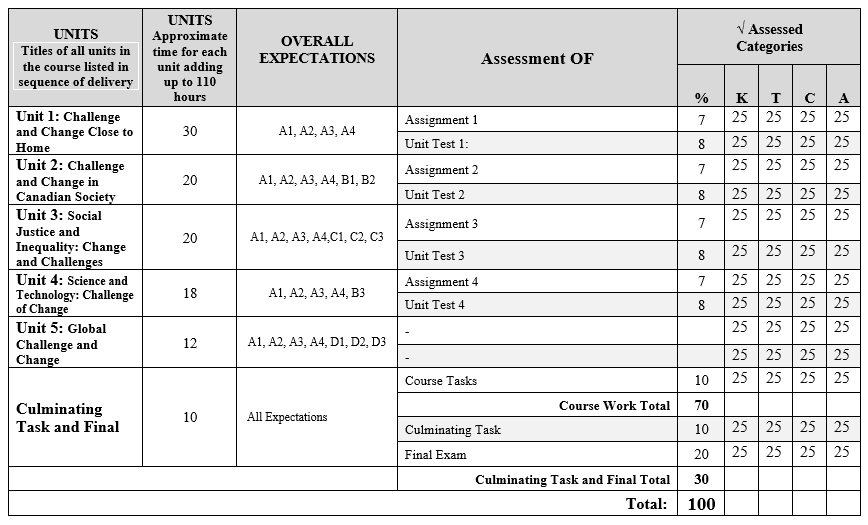Course Description
This course focuses on the use of social science theories, perspectives, and methodologies to investigate and explain shifts in knowledge, attitudes, beliefs, and behaviour and their impact on society. Students will critically analyze how and why cultural, social, and behavioural patterns change over time. They will explore the ideas of social theorists and use those ideas to analyze causes of and responses to challenges such as technological change, deviance, and global inequalities. Students will explore ways in which social science research methods can be used to study social change.
Course Code: HSB4U
Course Name: Challenge and Change in Society
Department: Social Science and Humanities
Hours: 110
Credit Value: 1.0
Pre-requisites: Any university or university/college preparation course in social sciences and humanities, English, or Canadian and world studies.
Curriculum Policy Documents: The Ontario Curriculum, Grade 9 to 12, Social Science and Humanities, 2013 (Revised)
Growing Success: Assessment evaluation and Reporting in Ontario School, First Edition Covering Grade 1-12
Development Date: August 2019
Developed By: Jimmy Chia, B.A.(Hons), M.Ed. B.Ed. (OCT)
Teacher:
Revised By: NA
Revision Date: NA
Overall Curriculum Expectations
Course Content
| Unit | Unit Title | Approx. Duration |
| Unit 1 | Challenge and Change Close to Home | 35 hours |
| Unit 2 | Challenge and Change in Canadian Society | 20 hours |
| Unit 3 | Social Justice and Inequality: Change and Challenges | 25 hours |
| Unit 4 | Science and Technology: Challenge of Change | 15 hours |
| Unit 5 | Global Challenge and Change | 15 hours |
| Culminating Task and Exam | 10 hours | |
| TOTAL | 110 hours | |
Unit Description
Descriptions taken from:
De Coeur, T., Christopher Rawes and Patricia Warecki. (2012). Challenge and Change: Patterns, Trends, and Shifts in Society. Toronto: McGraw-Hill Ryerson.
Teaching/Learning Strategies
- Research project
- Independent study
- Oral Presentations
- Debate
- Case summary
- Presentation
- Graphic Organizers
- Computer-Mediated Instruction
- Lectures
- Discussions
- Reading
- Pair Work
- Role Play
- Brainstorming
- Group work
Unit Organization

Assessment Strategies
| For Learning | As Learning | Of Learning |
|
|
|
Evaluation Strategies
Evaluation focuses on student’s achievement of the overall Expectations. Evaluation is basically collected from; observations, conversations, and student products.
Student Products include: tests, exams, rich performance tasks, projects, presentations and /or essays. Students submitting assignments that involved group work will be evaluated individually.
Before making a decision about a student’s final grade, the teacher will consider all the collected evidence of student products. The teacher will also consider that some evidence carries more weight than other evidence.
| Achievement Level | Percentage Mark Range |
| 4+ | 95-100 |
| 4 | 87-94 |
| 4- | 80-86 |
| 3+ | 77-79 |
| 3 | 73-76 |
| 3- | 70-72 |
| Achievement Level | Percentage Mark Range |
| 2+ | 67-69 |
| 2 | 63-66 |
| 2- | 60-62 |
| 1+ | 57-59 |
| 1 | 53-56 |
| 1- | 50-52 |
The final grade will be determines as follows:
- 70% Seventy percent of the grade will be based on evaluation conducted throughout the course.
- 30% Thirty per cent of the grade will be based on a final evaluation and the summative administered at or towards the end of the course.
Evaluation/Assessment Plan
| Unit | Unit Title | Approx. Duration | KICA % Application |
| Unit 1 | Challenge and Change Close to Home | 30 hours | 25/25/25/25 |
| Unit 2 | Challenge and Change in Canadian Society | 20 hours | 25/25/25/25 |
| Unit 3 | Social Justice and Inequality: Change and Challenges | 20 hours | 25/25/25/25 |
| Unit 4 | Science and Technology: Challenge of Change | 18 hours | 25/25/25/25 |
| Unit 5 | Global Challenge and Change | 12 hours | 25/25/25/25 |
| Culminating Activities (Task and Final Exam) | 10 hours | 25/25/25/25 | |
| TOTAL | 110 hours | ||
Resources
De Coeur, T., Christopher Rawes and Patricia Warecki. (2012). Challenge and Change: Patterns, Trends, and Shifts in Society..Toronto: McGraw-Hill Ryerson.
